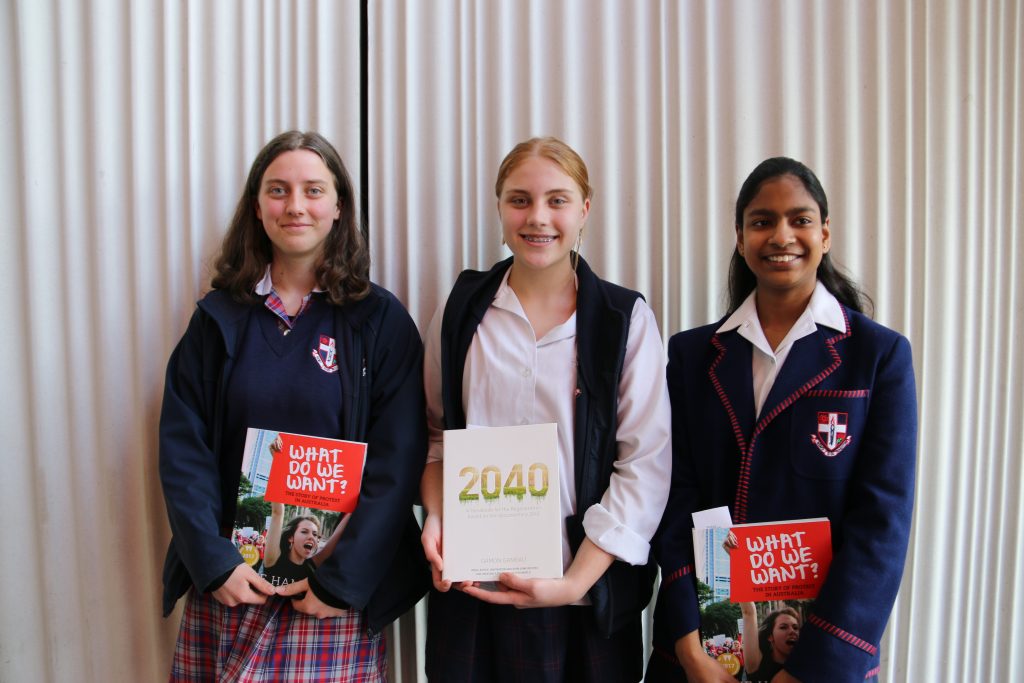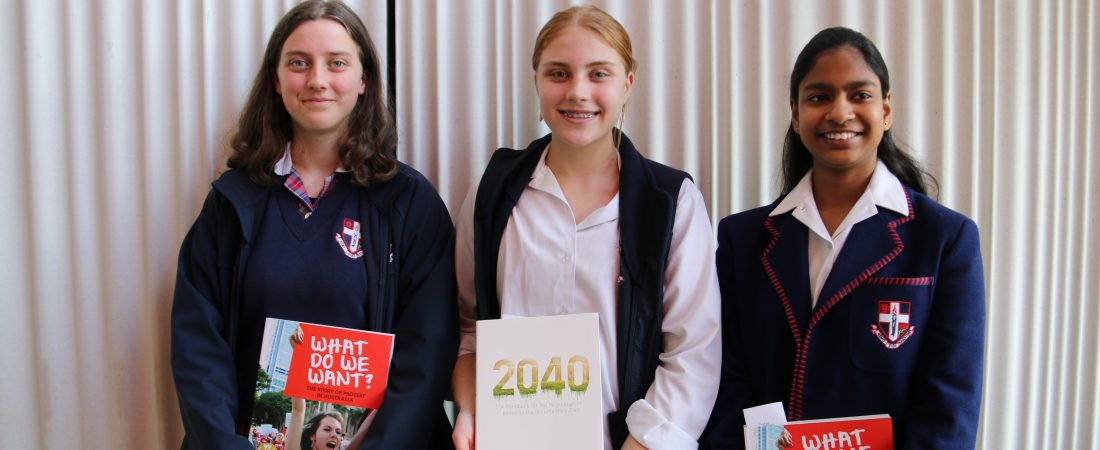Peter Jones Peace Prize 2022
Posted on September 16, 2022
The Peter Jones Peace Prize is an annual English Faculty writing competition that takes place in the High School. It was created in honour of long-serving Humanities and English teacher, and respected Quaker, Peter Jones, who has by renown, ‘let his life speak’.
Each year, students are provided with a prompt for their writing. This year students were invited to write either an essay, a piece of poetry, a short story or reflection in response to a comment made by (then) senior government minister, Matthias Cormann, stating that; “The children should be at school. They should be learning about Australian history.”
This year’s judging panel considered four shortlisted pieces, and finally settled upon three entries worthy of being Highly Commended and Commended.
Quaker Writer, Virginia Jealous, made the following observations about this year’s shortlisted entries:
“…each entry was original and compelling… responding to the provocation of the minister’s sound bite …. As writers and readers, how do we respond to provocation in a principled and helpful way?… This year’s shortlist of three poems and one speech. The first is … called ‘A Child Sits at Desk Learning”. One of the techniques this writer uses to hold my attention is repetition. The title is also the first line of each verse. It’s an image of stillness, of passivity, around which the action of the poem unfold.s In the poem the pronouns of ‘he’ and ‘his’ relate to the child in the title. The second poem is called “Fight for our future”. The writer of this poem uses “I’ and “My’, a very personalised voice and it’s a strong presence in the poems… opening up communication.. It’s not about saying “I’m right”, but “this is what I think. And it allows the audience to reflect and think in their own way. The notion of the past as a ‘squeaky clean floor’ was a surprisingly effective metaphor …. The third piece was a piece of prose; “Mister Glass Bottle Collector”, (in which Virginia) enjoyed the imagination at work …. The writer calls (the piece) a speech; technically words written to be read aloud, …and I found myself wondering at what point speech becomes story, and fact becomes fiction. There are complications, sometimes, telling a story within a story that uses real people with real names, especially if they are of public figures, but this is a very interesting example of … a contemporary parable; a moral story that goes beyond the specific to the universal. The fourth piece of writing, another poem, is called “Our History”. It’s a poem that is a series of four line stanzas … and the last line of each of these describes a particular historical event in the past or in an imagined future. These final lines are italicised which also helps to shape the poem for a reader’s eye; a different way of repetition…. This is a poem about lost opportunities and as such it opens a way … to imagine how things might be done differently … (such as) the apparently contradictory suggestion of leaving the classroom to teach others a lesson. … Writing (is) a tool for peace-building. … Peace is reverence for the earth and all living things, 9and) collectively that is a theme that has come through all the shortlisted pieces. Collectively they have left (ther reader) thinking about ways of taking words on paper and making them into action in the world.”
All entries in the Peter Jones Peace Prize are submitted to the Australian Friend and considered for publication – a wonderful opportunity to share student work with our wider community.
This year the Commended prize was awarded jointly to two students, both of whom entered poems. We congratulate Sahansa Udawatta (Year 10) for her poem titled ‘A Child Sits at a Desk Learning’, and Grace Winspear (Year 10) for her poem titled ‘Our History’.
The winning piece of writing was a well-crafted Speech by Hannah Wigston (Year 10), spoken about at length by Virginia Jealous at our High School Service Assembly, and titled “Mr Glass Bottle Collector’. Congratulations to Hannah. You can read all pieces below.

Mr Glass Bottle Collector | By Hannah Wigston
A speech regarding Michael McCormack’s views on climate protesting
“Disgraceful,” McCormack says. “Don’t give them the publicity,” he says. “Young people should be in school,” he says, sitting there in the camera frame reminiscing about the days that once were. The days where he collected glass bottles for the cent, counting down the minutes to the bell on his fingers, longing for the History lesson to be over. Sitting there, drenched in his own sweat, scorching alive in the Wagga Wagga heat that seemed to be getting hotter and hotter and hotter-
But, oh, how the times have changed.
Perhaps, I would have believed him in 2019. That, yes, we were just wasting our school hours lounging around the Parliament building, screaming our values to the brick walls when no one else would listen. But, I suppose he became addicted to the cycle he grew into at ten years old. Every glass bottle that went in a gleaming coin came out and the next thing he knew … his pockets were full.
He marvelled at the pile of coins that seemed to be growing day after day after day … and turned a blind eye to the bottles growing on the other side. For, everything we take leaves a mark. Every tree fallen is one less home. Every loose plastic bag is a seagull dead. And every protest discouraged, is an opportunity wasted.
But as the clock ticked on, and the society surrounding him evolved … he remained the ten-year-old boy he once were in ‘75. For time is money and money … is worth it. It’s worth the sinkholes, the erosion, the deforestation, the draining and draining and draining until all that is left are the dead remnants of our past actions. And all for what? To prevent a financial implosion? For his eyes were blindsided with greed, as his once innocent habit evolved into an addiction. An addiction that the more he took, the more it took over him. What once were harmless glass bottles developed into his obsession with the material reward. An uncontrollable need to mine away our planet to smithereens, whilst drawing in the money that cannot mend our shattered world.
“But it’s okay, everyone calm down,” McCormack says. For, the children are in schools learning about Australian history. For, we are getting a worthwhile education, turning a blind eye to our Earth as it eats itself away, suffocating in the emissions that we have created. But instead, we sit and wait. Waiting … lounged in our school chairs, counting down the minutes to the bell on our fingers as we burn alive in the Wagga Wagga heat.
But, oh, how the times have changed.
For time is money and money is … worth it. For the consequences do not exist if we just close our eyes and imagine a world where the taking is enough. But the more we take, the more it takes over us and, yes, time is money but we do not have time. For the more time we take, the less chance our planet will regrow … will regenerate and mend itself from the harm we have infringed upon it. For the Earth is our patient, and will not survive if we continue to neglect over choosing to nurture. So, when our planet is the patient … we are the carers.
But, oh how the times have changed, but how exactly? Marsha P. Johnson, Kendrick Sampson, Frida Kahlo, Malala Yousafzai, Lee Merritt and Grace Tame. The change began with them … the ones who fled the school the second they felt they had a purpose elsewhere. Not with the ones who counted down the minutes on their fingers … the ones who became just what is expected; cogs in a corrupt financial system. So, yes, the times have changed, but how exactly?
The people who protest.
So, I apologise, Mr McCormack, if I refuse to sit through another ten minutes and fifty-three seconds of the lesson, whilst our home outside of home needs defending. Our mother that has nurtured us despite all of our taking, now begs for us to clean our mess. This is our reality. And, yes, history is important, but this is our present. Our present that every action we take will determine our future. And, we must preserve our future … before we study Australia’s past.
References:
Deputy PM Tells Strikers to Strikers to Stay In School: Strikers say: Not til you take urgent climate action 2021, viewed 6 July 2022, <https://www.schoolstrike4climate.com/post/deputy-pm-tells-strikers-to-stay-in-school-strikers-say-not-til-you-t ake-urgent-climate-action>.
Hassan, F 2019, McCormack warns students against joining a climate change protest, viewed 6 July 2022, <https://www.sbs.com.au/language/english/mccormack-warns-students-against-joining-a-climate-change-protes t>.
Marsha P. Johnson 2022, Wikipedia, viewed 6 July 2022, <https://en.wikipedia.org/wiki/Marsha_P._Johnson>.
McCarthy, J 2020, 14 Racial Justice Activists & Authors You Should Know, viewed 6 July 2022, <https://www.globalcitizen.org/en/content/black-activists-authors-us-racial-justice/>.
Scott Morrison tells students striking over climate change to be “less activist” 2018, The Guardian, viewed 6 July 2022, <https://www.theguardian.com/environment/2018/nov/26/scott-morrison-tells-students-striking-over-climate-change-to-be-less-activist>.
A Child Sits at a Desk Learning | By Sahansa Udawatta (Year 10)
A child sits at a desk learning
About World War One,
Gallipoli, the Western Front,
Passchendaele and the Battle of Somme,
While around him the world stops breathing.
A child sits at a desk learning
While a match has been lit.
Temperatures rage and bushfires scorch,
Their fury, their wrath stinging.
A child sits at a desk learning
While winds howl through Hobart,
Families float in floods,
Waves swallow, leaving them hollow.
A child sits at a desk learning
While our home crumbles.
Ice sheets melt while we sleep.
Some weep but aggression speaks.
A child sits at a desk learning
Drowning in a sea of sin,
Passed on by those before him.
Wondering how many oceans he must swim,
For understanding to begin.
A child sits at a desk learning
About how he fits into the picture.
Bars on his heart,
Locks on his eyes,
Forced into the box,
No saviour knocks.
A child sits at a desk learning
About war, about the anger of the Earth.
About how the world could be his,
If only he could salvage its ruins,
Make his voice heard,
And join the fight
For the future.
A child sits at a desk learning
About the need to leave that desk behind.
Our History | By Grace Winspear (Year 10)
Winds stirring
Sea levels rising
Pollution in the air
Australia was colonised in 1788
Homes flooding
Land eroding
Rainforests set alight
The states federated in 1901
Smelters churn
Coal burns
The clouds are looking sick
The 1956 Olympic Games were held in Melbourne
Acid rain
So few species remain
Still the factories belch smog
The Sydney Opera House was completed in 1973
People choke on poisonous air
The profit is too large to care
Fires billow in the trees
Julia Gillard becomes Australia’s first female Prime Minister in 2010
Youth are meant to be educated not educate
But this climate crisis cannot wait
We leave the classroom to teach denialists a lesson
Australia leaves the Paris Agreement in 2030
Fists lifted; voices raised
You can hear the hurt; we feel betrayed
We march for the ever-shortening future
Taronga Zoo desperately try to breed the last remaining koalas in 2045
Go back to school our leaders say
Fight this fight another day
On the weekend would be preferable
In 2053 coastal Australians are forced to leave their homes due to rising sea levels
Learn our nation’s history
Uncover the great mystery
Why Australia sat back and did nothing while the world suffocated
In 2061 the last piece of the Great Barrier Reef is officially dead
